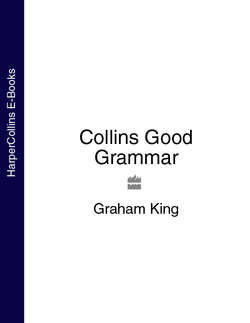Читать книгу Collins Good Grammar - Graham King - Страница 15
Types of Regular Sentences
ОглавлениеEarlier, we defined four uses for sentences. Each of these calls for a different type of sentence, and it’s worth knowing what they are:
A DECLARATIVE SENTENCE makes a statement:
A rose bush grew in the garden.
Ben has just thrown a ball through the window.
An INTERROGATIVE SENTENCE asks a question:
Is that a rose bush in the garden?
Did Ben just throw a ball through the window?
An IMPERATIVE SENTENCE directs or commands:
Look at that rose bush in the garden.
See if Ben’s thrown a ball through the window.
An EXCLAMATORY SENTENCE expresses emotion:
I wouldn’t dream of touching that rose bush!
I’ll scream if Ben’s thrown a ball through the window!
Another aspect of a sentence is that it can express thoughts or actions positively or negatively:
I like eating in restaurants is a positive sentence.
I don’t like eating in restaurants is a negative sentence.
The difference may seem obvious in these two examples but a sentence can damage itself with the inclusion – sometimes unconsciously – of double negatives and near or quasi-negatives:
I don’t know nothing. (non-standard double negative)
It was a not unusual sight to see the heron flying away. (acceptable double negative)
I hardly saw nobody at the sale. (negative and quasi-negative)
There’s no question that Robert will pay the debt. (negative, but the no question is intended to positively express ‘no doubt whatsoever’)
I can’t help but applaud her generosity. (intended to be positive but grammatically the sentence expresses a negative sense)
The second example is an instance of what is called litotes (pron. LY-to-tees), which is an elegant form of understatement expressed by denying something negative:
She’s not a bad cook means She’s quite a good cook.
The effect is by no means negligible means The effect is quite noticeable.
The negative/positive aspect of sentences is worth noting because a diet of too much negativism in your speech and writing can have an overall negative or depressing effect, and can be confusing, too. Sometimes it is better to express negative thoughts in a positive way. She is not beautiful or She’s by no means beautiful are not only negative but vague – she could be statuesque or handsome. A more positive and precise description might be: She is rather homely.
